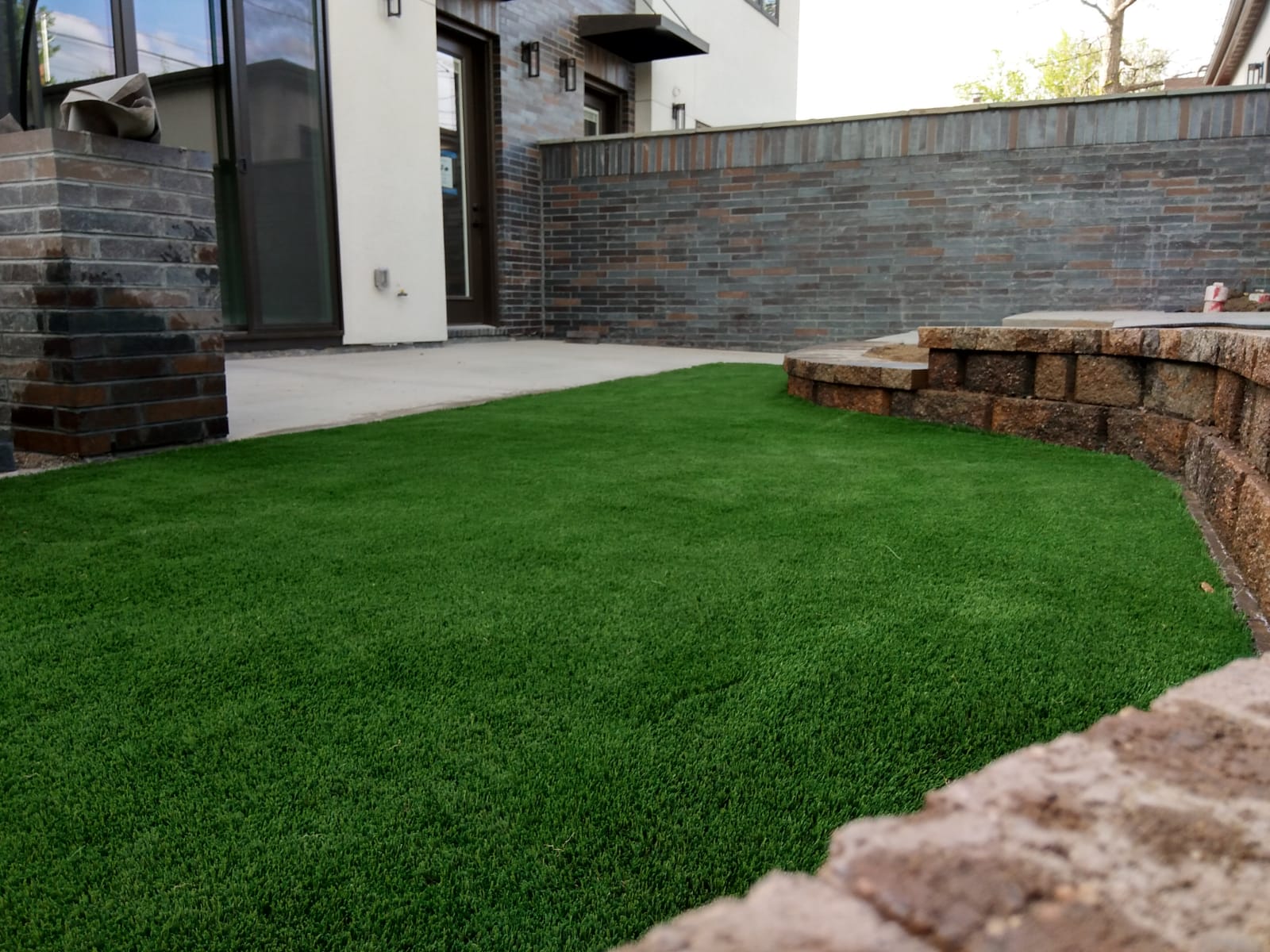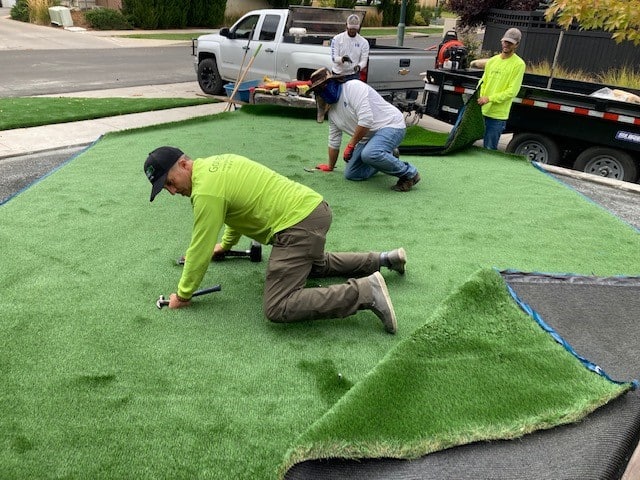Expert Artificial Grass Installation Canoga Park for Hassle-Free Lawns
Leading Reasons to Consider Artificial Yard for a Rich and Low-Maintenance Yard
As home owners progressively seek sustainable services for outdoor spaces, artificial turf provides an attractive option to conventional lawns. The advantages extend beyond mere aesthetics and sustainability; exploring the complex implications of man-made grass reveals an extensive strategy to yard monitoring that merits much deeper factor to consider.
Year-Round Greenery
Among one of the most considerable advantages of synthetic lawn is its capability to provide year-round greenery, despite climate problems. Home owners typically face obstacles in preserving a vibrant grass because of seasonal modifications, dry spells, or heavy rains. Man-made grass removes these concerns, making sure a constantly lush look throughout the year.
This artificial option is engineered to withstand diverse weather circumstances, from burning summertime warm to freezing winter months temperatures. Unlike natural turf, which might brownish or end up being irregular during extreme conditions, synthetic grass maintains its vivid shade and texture, improving the aesthetic appeal of any type of landscape.
Furthermore, man-made yard is resistant to bugs and illness that usually influence natural yards. This strength adds to its long-lasting charm, as there is no requirement for chemical treatments or fertilizers that can be dangerous to the atmosphere. Furthermore, property owners can take pleasure in the visual benefits of a well-maintained grass without the intermittent obstacles posed by all-natural lawn treatment (artificial grass installation).
Lowered Upkeep Initiatives
Man-made grass dramatically minimizes maintenance efforts, allowing homeowners to enjoy a beautiful grass without the taxing tasks linked with all-natural lawn treatment. One of the most remarkable benefits of artificial lawn is the removal of normal mowing. Without any need for a lawnmower, home owners save both time and the cost of upkeep connected with this devices.

Cleaning up fabricated yard is straightforward; a straightforward rinse with a hose pipe or the periodic brushing to eliminate debris is typically enough - artificial grass installation. This convenience of treatment allows home owners to spend even more time appreciating their outdoor spaces instead of struggling over them. In summary, the lowered upkeep efforts related to artificial yard make it an enticing option for those looking for a stunning, convenient yard
Water Preservation Conveniences
The significant decrease in upkeep initiatives related to synthetic lawn encompasses water preservation, making it an eco-friendly option for property owners. Typical lawns call for significant amounts of water to continue to be lively and lush, typically causing too much water use, particularly in deserts. On the other hand, artificial grass gets rid of the need for normal watering, substantially decreasing the overall water intake in your yard.
By choosing synthetic grass, home owners can preserve thousands of gallons of water yearly. This shift not just advantages private households yet additionally adds to more comprehensive environmental initiatives aimed at decreasing find more info water waste. In locations experiencing water scarcity, the fostering of artificial grass can play a significant function in alleviating the effects of dry spell and making certain that important water resources are used a lot more efficiently.
In addition, the setup of synthetic turf can help reduced metropolitan water demand, benefiting the area as a whole. With expanding recognition of environmental concerns, picking synthetic lawn functions as a proactive action towards sustainable landscaping, assisting to maintain all-natural water sources while maintaining an aesthetically pleasing exterior area (artificial grass). In recap, man-made yard provides a compelling option for water conservation, aligning environmental duty with contemporary landscaping demands

Bug and Allergy Reduction
A substantial benefit of installing synthetic turf is its ability to reduce insects and allergens in outside spaces. Typical lawn yards typically offer as breeding grounds for pests such as mosquitoes, ticks, and ants, which can develop pain and health risks for family pets and families. In comparison, synthetic grass gets rid of the organic product that draws in these bugs, thereby substantially lowering their populations in your backyard.
Additionally, all-natural Our site yard can nurture mold, pollen, and various other irritants, which can cause allergies and respiratory issues for delicate individuals. Artificial grass provides a cleaner setting, reducing the capacity for allergenic reactions. Unlike natural yard, man-made turf does not create pollen, making it an outstanding alternative for allergic reaction victims seeking to appreciate their exterior areas without the threat of flare-ups.
Furthermore, the absence of dirt in synthetic grass suggests there is much less dirt and dirt, more minimizing air-borne irritants. This low-maintenance option not just improves the aesthetic allure of your yard however also advertises a much healthier exterior setting, allowing families to enjoy their lawns without the continuous fear of irritants and bugs. Therefore, synthetic turf is a critical selection for those prioritizing convenience and wellness in their exterior living rooms.
Long-Term Price Savings
Investing in artificial lawn can lead to significant long-term cost savings for home owners. Man-made lawn eliminates the need for regular grass upkeep expenses, such as mowing, fertilizing, and watering.
In addition, the longevity of synthetic grass additionally improves its cost-effectiveness. A lot of high-grade man-made grass items can last 15 to 25 years with minimal upkeep, decreasing the requirement for substitute or extensive fixings. On the other hand, all-natural turf might require constant reseeding and regular treatment, which can promptly accumulate in expenses.
Energy cost savings are one more critical element. Home owners can anticipate to see reduced water bills, as artificial lawn does not require watering. Furthermore, the reduction in grass care services can liberate useful time and sources, enabling house owners to assign their spending plans somewhere else.
Final Thought
In summary, fabricated grass provides various benefits for homeowners seeking a low-maintenance and lively landscape. Its capability to give year-round plant, combined with decreased upkeep initiatives and considerable water preservation, makes it an enticing choice. In addition, the reduction of bugs and irritants adds to a healthier outside atmosphere. Ultimately, the long-term expense financial savings associated with synthetic grass strengthen its status as a lasting and functional solution for boosting outside areas.
Artificial yard considerably minimizes maintenance initiatives, enabling property owners to enjoy an excellent yard without the time-consuming jobs associated with all-natural lawn treatment.The substantial decrease in upkeep initiatives associated with man-made yard expands to water conservation, making it an environmentally friendly choice for homeowners. In comparison, artificial grass gets rid of the demand for routine watering, considerably minimizing the total water consumption in your yard.
In locations experiencing water deficiency, the fostering of artificial yard can play why not look here a substantial function in minimizing the results of drought and making certain that important water sources are used extra successfully.
With growing recognition of environmental issues, picking synthetic lawn serves as a proactive action in the direction of sustainable landscaping, aiding to protect natural water sources while maintaining an aesthetically pleasing outdoor space.